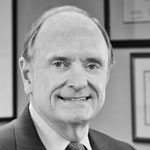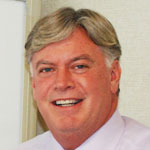Stephen Prince is many things; a driven competitor, a serial entrepreneur, a compassionate and generous counselor, “a hungry Mastiff dog … and sometimes you’re the bone,” proud father of four, and a global executive who knows the back streets of Bangalore as well as he knows his Texas neighborhood. From a Southern California lifeguard to chief accounting officer with Edison Enterprises to managing global channel relationships for Oracle, Prince focuses on top performance—no matter the hours or miles. As CEO of OptiSense Networks, manufacturer of optical sensors for smart electrical grids, Prince finds opportunity in being a leading voice for new approaches in a 150-year-old industry coping with increasing demand, increasing super storms, and increasing risk.
Stephen, what drives you?
Prince: I want to change the world for the better. This century will see global communities collaborating in all aspects of our lives via smartphones. Entrepreneurs are developing technologies that will change the way we learn, age, and work. My kids will have
careers that haven’t even been invented yet. Everyday, governments, citizens, and businesses are finding new ways to meet the challenges of the 21st century. And all of this relies on electricity.
I am excited that OptiSense Networks has the opportunity to change the world of power usage in this next century. It is my vision that OptiSense will be a brand akin to that of Google, Facebook, Intel, or Apple, because of the impact we can have on lives in super storms like Hurricane Sandy or in reducing the cost to generate power.
Lastly, I’m excited that through the convergence of telecom optical engineering and smart-grid innovation we have the ability to create new career paths for workers in North Texas.
How did you get your start?
Prince: I’ve been in the utility industry for more than 20 years—as chief accounting officer with Edison Enterprises, as an industry practice leader with SAIC, and as a software executive with Excelergy and Oracle. But the business bug bit me early. While lifeguarding in college, I started a clothing company with two other partners called Off Duty Sunwear. While we were very successful, my partners’ lack of basic business knowledge and tax regulations ultimately caused irreparable damage. Those lessons showed me the discipline and integrity needed to be successful throughout my career.
Every career has obstacles. Was there a time, a person, or an event that was a catalyst in yours?
Prince: When serving at Edison Enterprises, the company sent me to the Center For Creative Leadership in LaJolla, California. The program brought to light my strategic abilities, leadership skills, and performance orientation. It was the catalyst for me considering becoming a CEO.
The program also highlighted that personal integrity is key to my success of overcoming obstacles. People have to trust you and see you do what you say, even when they are not looking. I am of the philosophy that you don’t ask things of others you are not willing to do yourself, and that people enjoy a challenge and the opportunity to grow, even though they might not know it at the time.
How has working in global business environments affected your ideas?
Prince: The world is a small place once you have conducted business on behalf of multinational corporations as an officer! The pace of business and the patterns of conducting business were unnerving at first. I was very goal oriented, but learned immediately that I had to move at the country’s pace and respect each culture and business methods.
You learn that your reputation and behaviors follow you and that personal integrity is everything. For example, two-and-a-half-hour lunches are common in Italy. Alcohol is served, coupled with a preference for verbal communication—versus clear-cut written documentation. I learned to listen, listen, listen, and put heavy emphasis on building trusting relationships.
My initial exposure to Russia while with Oracle was interesting because there were so many rules and protocols in order to avoid physical and business risk. Dealing with the potential risks, while still making transactions happen, required dependence upon local partners and commercial vehicles that insulated Oracle from regulatory noncompliance.
I learned a great deal about the importance of following structure and protocols to the benefit of myself and the company. These lessons are essential to the execution and success of OptiSense around the globe and cannot be learned in a textbook.
You held important management positions before joining OptiSense. What got you interested in pursuing sensor technologies?
Prince: A utility lineman has one of the 10 deadliest jobs in the world. When there is a power outage, the utility doesn’t know about the outage till you or I call, where the outage is located, or what caused it. The traditional approach to finding and fixing the outage has the potential to harm the lineman in many ways, including electrocution. Now, multiply that risk in the instance of ice storms, tornadoes, and downed lines.
Our sensors can tell the utility where the outage is, sense if the line is still energized, and help in rerouting power while the lineman works—because we provide intelligence beyond the substation. The only way a true “smart grid” will occur on the distribution lines across the globe is if utilities adopt our technology. There is not enough time, people, or physical assets to get it done in the timeframes required to sustain the natural power-usage growth without our sensors. Because of my experience with utilities from Texas to Tokyo, I understood that OptiSense could change the world of power usage through medium-voltage sensing. Who wouldn’t want the chance?
What are your plans for the future of OptiSense?
Prince: I want to develop OptiSense into a world-class organization from top to bottom. I want OptiSense to be the number one employer in the [Dallas-Fort Worth] Metroplex, recognized as one of the fastest growing job creators in the region. I want OptiSense to gain industry recognition for quality,
innovation, and value, along with sustainable portfolio growth for our investors.
To do this, we are building a company culture, community, and family that has trust, respect, concern, and a common vision. I am careful to find people that share my same values. I like diversity and try to balance personality types within the genetics of an organization. Transparency and integrity are essential—otherwise a person will not last in the culture I create.
Lastly, I actively look for opportunities to create a company-wide culture of performance and recognition of those that excel. If you are going to change the game in a 150-year-old industry, you’ve got to nurture game-changers.

